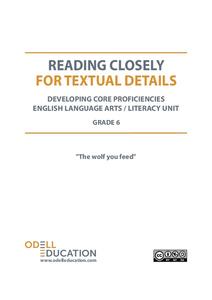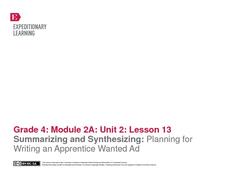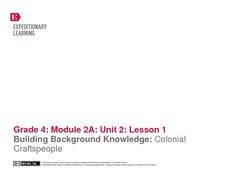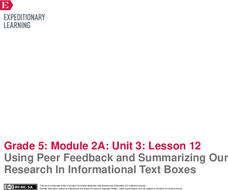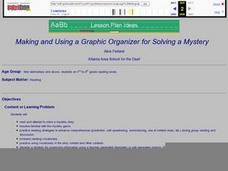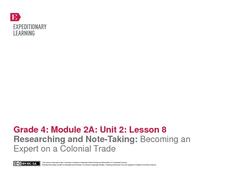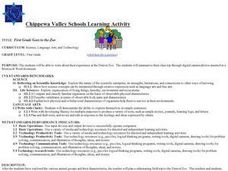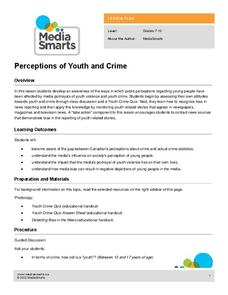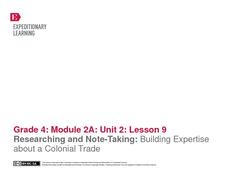Odell Education
Reading Closely for Textual Details: Grade 6
Close reading doesn't mean to literally read text close to your face, but rather to pay attention to particular details in order to develop a deep and purposeful understanding of text. The first part of a five-part resource provides an...
Center for Open Educational Resources and Language Learning
Reading Activity
Ready to integrate technology into your ELL instruction? Check out this reading lesson that has language learners using the Internet and apps, joining online book clubs, and creating blogs. A fine model of what can be done.
EngageNY
Summarizing and Synthesizing: Planning for Writing an Apprentice Wanted Ad
In instructional activity 13 of this unit on colonial trade, young researchers learn about apprentices as they prepare to write help-wanted ads for the specific trade they have been researching. To begin, the class listens closely as the...
EngageNY
Mid-Unit 3 Assessments, Part 2: Summarizing, Analyzing and Discussing Research
Why is reading important? As part of the mid-unit assessment, scholars read, summarize, and analyze an article about the importance of reading. Additionally, they continue their discussion about whether their rules to live by should be a...
EngageNY
Building Background Knowledge: Colonial Craftspeople
In the first lesson plan of this unit on colonial trade, fourth graders gain background knowledge of different jobs performed by early colonists. The class begins with a slide show presentation that includes a variety of great...
EngageNY
Using Peer Feedback and Summarizing Our Research In Informational Text Boxes
Insert text box here. Learners use index cards to create their own informational text boxes. The text box includes information about an insect in the rainforest. Scholars also complete the draft of their research science journal entries.
Polk Bros Foundation
Science Learning Summary Guide
Apply reading standards to your science curriculum by asking pupils to complete this guide. Individuals note down important vocabulary as well as two ideas they learned and two supporting facts for each idea. They then take this...
Media Smarts
Broadcasting Codes
Let your learners be the judges for a series of case studies that focus on broadcast codes in Canada. In order to familiarize your class with the codes and guidelines that govern the broadcasting industry, in particular Canada's...
Polk Bros Foundation
Show, Then Write What You Learn
After reading a text or covering a new topic, have class members fill out the four boxes on this page with facts. Individuals can use words or drawings to represent the facts.
Curated OER
Making and Using a Graphic Organizer for Solving a Mystery
Students create tables in a word processing program which helps them organize their text clues when reading a mystery story. They develop reading comprehension strategies while using a computer based graphic organizer in order to solve...
EngageNY
Researching Part 2: Reading for Gist and Gathering Evidence Using the Researcher’s Notebook
The gist should be short and sweet! Pupils practice finding the gist of an informational text and then write a summary of the text. Next, they gather with their research teams to discuss a focus question based on the novel Bud, Not Buddy...
EngageNY
Researching and Note-Taking: Becoming an Expert on a Colonial Trade
Fourth graders work in small groups to become experts on different colonial trades in the eighth instructional activity of this unit. Working toward the long-term goal of writing a piece of historical fiction, young scholars read...
Curated OER
First Grade Goes to the Zoo
First graders summarize their trip to the zoo. In this summarizing lesson plan, 1st graders will study animals that they may see at the zoo including their characteristics and habitats. Once the trip is done, they create a word document...
Curated OER
Merging New Technology with Old Stories
Is your city's history a mystery to your class? Ever wonder if your county contains a bounty of folklore? Young computer scientists incorporate technology with time-honored tales during a project with both individual and group...
Curated OER
Literature Circle Preparation
The secret to a successful literature circle discussion is preparation. Readers prepare for such a discussion by completing a two-page worksheet that asks them to summarize the text, record new words, ask and answer questions, and...
Media Smarts
Perceptions of Youth and Crime
Explore the potential for bias in the news and in scholars' own attitudes and opinions. Begin with a quiz on youth crime to see how learners perceive crime among their peers. After looking at the correct answers, put individuals in...
EngageNY
Finding Relevant Information and Asking Research Questions: The Benefits of Video Games
Video games may not be so bad after all. As scholars read the text "The Many Benefits, for Kids, of Playing Video Games," they summarize the gist in their researchers' notebooks. Next, pupils draft supporting research questions based on...
Santiago Canyon College
Taking Notes for Science Class
Provide young scholars with the tools they need to succeed with this reference on the Cornell note-taking strategy. By breaking the content of lessons into main ideas, supporting details, and overall summaries, students are...
Curated OER
Animal Diaries
Students read Diary of a Worm by Foreen Cronin. In this journal writing lesson, students research an animal and write a diary by their animal. Students apply the research they've completed in their writings. Students share their diaries....
EngageNY
Listening Closely and Taking Notes: Colonial Trade Podcast About the Wheelwright
Voices from the past. Young scholars listen to a podcast interview with a historical re-enactor as they continue their research in the eleventh instructional activity of this unit on colonial trade. Applying their close reading skills,...
Curated OER
Face to Face Summary!
Students, while in the computer lab visiting the National Geographic Kids website, fill out a checklist of unimportant/redundant information, look for important events and ideas and search for the author's main idea and supporting...
EngageNY
Researching and Note-Taking: Building Expertise about a Colonial Trade
Building on the previous activity in this unit on colonial trade, the ninth activity has young experts continuing their research and writing summaries of the information they find. To begin, children participate in guided practice where...
North Carolina State University
Integrating Your Research
Employ this resource to expand efficient ideas on how to present and organize activities that describe how researchers can implement their research by using direct quotes, paraphrasing, and summarizing—without plagiarizing. Activities...
Curated OER
Kumeyaay Indians
Useful for literary analysis, citing textual evidence, or summary skills, this activity about the Kumeyaay Indians would be a good addition to your language arts class. Middle schoolers read novels and summarize the literature in their...
